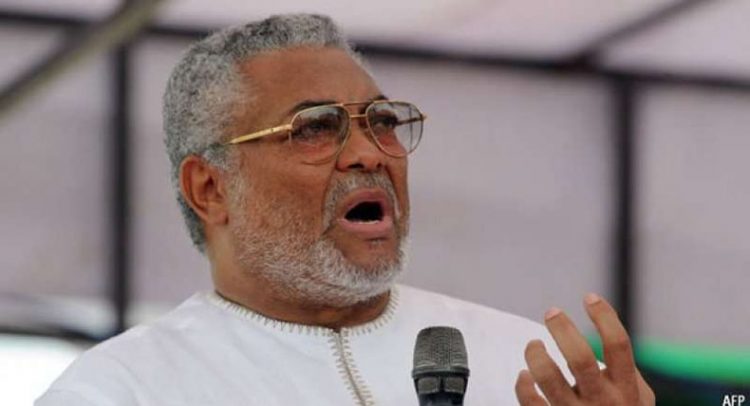Former President Jerry John Rawlings
Almost three years after former President Jerry John Rawlings filed a libel suit against the publishers of Africawatch Magazine, the case is now set to take its course at an Accra High Court.
It follows the dismissal of an application for stay of proceedings, which was filed by Africawatch against the former President.
The former President sued the magazine in November 2016 for “aggravated and exemplary damages,” among other claims, after the magazine claimed he had Parkinson’s disease.
Hearing of the case was delayed because when the former President initiated the action, Africawatch proceeded to court to raise preliminary objection to the effect that the magazine, with Steve Mallory as its Executive Editor, was not based in Ghana and therefore challenged the jurisdiction of the court to hear the matter.
The magazine claimed the former President should have sued them in the United States. The application for stay of proceedings followed an appeal against the decision of the court.
Main Suit
Mr. Rawlings filed the suit at the Accra High Court against the magazine and five other respondents, including General Media Strategies Inc, its publisher; Liberty Media Concepts, the Ghana office of the US-based magazine, and Steve Mallory, Executive Editor.
The magazine, in its May 2016 edition, claimed in its cover story that the former President was suffering from Parkinson’s disease.
According to the magazine, the disease was eating Mr. Rawlings’ strength away and that there were bleak days ahead of him and therefore needed prayers.
However, lawyers for Mr. Rawlings denied the report, describing it as “a blatant lie motivated by malice.” They claimed the authors did not even bother to cross-check with the plaintiff and denied that Mr. Rawlings was suffering from the disease.
The suit, which was deposed to by Kobina Andoh Amoakwa of the office of the former President, averred that the defendants also ignored a request to retract the claims and stop the further distribution of the publication which was not published under any circumstance of privilege.
“Plaintiff states that the said publication was injurious to his reputation, as he and his immediate family and his team of staff were inundated with calls from friends and family members all over the country and abroad and harassed by the media following the outbreak of the said story.
“As an international statesman whose services were sought on the continent and abroad, the said publication had the effect of projecting him as unwell and unfit for his much sought after international engagements.”
Jurisdiction Challenge
Lawyers for the publisher of the magazine and its executive editor then filed an application challenging the jurisdiction of an Accra High Court, presided over by Justice Kweku Ackaah Boafo, to hear the suit in the first place.
The defendants claimed if the former President wanted to sue the defendants, then he should have commenced an action against them in the United States and not Ghana.
Rawlings’ Response
Mr. Rawlings then opposed the application and the presiding judge, in his ruling, dismissed Africawatch’s action on the grounds that the premise of the magazine’s application was flawed and incompetent.
The court also held that on page 6 of the 2016 edition of the magazine which contained the alleged impugned article, the publisher provided its addresses in both New York and Ghana.
Africawatch Appeal
Not satisfied with the decision of the High Court, Africawatch filed an appeal against the trial court’s decision at the Court of Appeal and subsequently filed another application, praying the trial court to halt its proceedings pending the determination of the appeal.
Africawatch insisted that if the proceedings were not stopped, it would force them to contest the suit.
It said if that happened, it would be costly and inconvenient because its owners would have to travel to Ghana to attend court.
Justice Ackaah Boafo, however, dismissed the stay of proceedings application, saying “to my mind, it cannot be denied that every litigation is expensive and can be inconvenient but those alone cannot and should not trump over any individual’s right to seek justice if he/she believes that his rights have been trampled upon, notwithstanding where the adversary resides.”
“Logically, for the applicants, it should be a foreseeable cost of doing business.”
A cost of GH¢2,000 was awarded against the defendants.
By Gibril Abdul Razak


